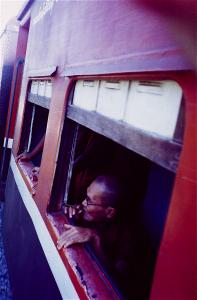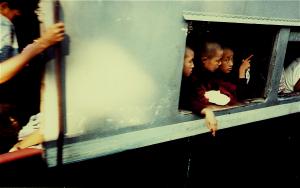I am about to embark on a trip that I have been planning for months. with mild trepidation. I board the night express train from Mandalay to Myitkyina. Myitkyina is located in Kachin State; a semi autonomous region in northern Myanmar. It's also the last stop on the line heading north.
The day of my departure was quite hectic. I planned on taking a taxi to the train station, but a student whom I had become friends with, insisted on driving me there on his motorbike. We met when I became the guest speaker at an English language training center in Mandalay.
Weaving through heavy motorbike traffic and dust clouds from the unpaved roads of downtown Mandalay, we zoom by all the 1950-era bicycles that make up early morning rush hour. I try to adjust the motorbike helmet – two sizes too small for my large foreign head. I cling onto the motorbike with an overstuffed backpack.
I need to watch my balance, or I will spill the contents of my pack on the dusty road. We make it to the crowded station, with half an hour to spare. My backpack feels as though it were loaded with lead. The humidity is so intense, I can feel the sweat blossoming like a flower on my shirt. I am not surprised about the heat. All guidebooks warn travelers about Myanmar during the summer months. I glance at my Burmese friend who isn't even breaking a sweat; he assists me to the platform and helps me find my sleeping car. The car is packed; we still have 30 minutes before the train departs. I thank my friend for his help and generosity. I bid him farewell.
l glance at what will be my home for the following two days. The train is not clean; the walls of my sleeping berth are covered in wallpaper that must have been attractive at one time. The color is now a pale yellow, mildewed, faded and peeling from the humidity and covered in brownish stains. The cars of the train look like they date from the 1950s. At least I have a sink. I attempt to turn the handle and a slow trickle of rust-colored water drips out of the faucet. The celling fan doesn't work; I'll leave the window open.
My research indicated that the railways in Burma are in decrepit condition and dangerous. It can take longer than two days to make it north, if it gets there at all; derailment is a common occurrence. I cross my fingers and hope that I don't have to visit a Burmese hospital.
As I acclimatize to my new surroundings, I mark my territory, so to speak. I throw my pack on the lower bunk. I assume that is also where I will attempt to sleep. I start to get comfortable. Three Burmese men enter the four-bunk berth. My new companions smile and mumble a greeting in English. Both are wearing longyi, the sarong like wrap favored by 99 percent of the population. They carry ancient looking suitcases and a cardboard box wrapped in twine. I wonder what they think about this strange foreigner with his modern looking backpack and beat up camera. I hear commotion and find more passengers entering the car. The train slowly rolls away from the station. We are on our way.
Small brown hands are thrust into the windows of the car. Its the street vendors trying to make one last sell. The train picks up speed. It stops at several stations along the way for more passengers, hundreds of them. I soon realize why it takes so long to reach Myitkyina.
My sleeping car has been taken over by Buddhist monks. They come in every shape and size; in different shades of red. Young and old – many have blood stained red lips and blackened teeth from consuming betel nut. Betel nut is a mild stimulant. For some reason, it produces a chemical reaction that stains your teeth. The monks take up positions at open windows and enjoy the natural conditioning, as well as the ability to spit out red globs of betel nut while the train is in motion. I realize this is the only way to cool down; I join them, mindful of the blow back from the spit. I feel like a golden retriever sticking my head out of a car window, but it works.

 Tattooed monk
Tattooed monk
I strike up a conversation with a 72-year-old monk who was in the British Merchant Marine when he was in his 30s, and supposedly sailed around the world. He constantly smokes Burmese cheroots, which look similar to Cuban cigars. He smiles, laughs and sings English pop songs from the sixties. I notice a faded blue tattoo of a star on his upper bicep; it catches my eye. While we are talking, the train conductor enters our car with three men in civilian clothes wearing dark sunglasses and military style hair cuts. They proceed directly to my sleeping berth. The tattooed monk instructs me not to stare at them, but to continue talking, looking out the window. He eavesdrops on their conversation; the men are from the Burmese secret police. They are investigating the gentlemen in my sleeping berth.
Am I in an Agatha Christie novel?
How ironic that I am rooming with men who are under investigation, or is this a ruse and they are investigating me? The monk fills my head with intrigue; the younger monks look on with curiosity. The investigation lasts about 15 minutes. I look over; one of the interrogators glances at me with intensity. What should I do – act like a bumbling tourist if I am questioned.
I sit down with my monk friends; we enjoy the violent rocking of the cars as the train picks up speed. The train rocks back and forth as though we are on an amusement ride. One of the female passengers vomits into a bucket on the floor. Day soon turns into night and the monks retire to their berths.
Alone, I take in the countryside. We pass several small outposts the farther north we venture. Soon there are few lights; darkness envelops the outside world. Squadrons of insects (some so strange looking that I feel like I am hallucinating) hover around an exposed light bulb and fall into my shirt. I am lulled into semi conscientiousness by the persistent heat, humidity and steady motion of the train. I see lights approaching and the faint outlines of colonial style buildings.

 Monks grabbing street food
Monks grabbing street food
The train is slowing down; we must be nearing a station. It is 12:00 a.m. Many of the faces hovering next to the rail are glowing with a yellow luminescence; it's from a natural face cream available in Myanmar called Thanakha. Women wear it to protect their skin from the intense sun. It makes a startling contrast against their dark skin, especially at night. We pull up to the station; hundreds of people are climbing on the train, or frantically trying to get off. The monks wake up from their stupor and rush to the windows. Street vendors are selling fruit and bottled water. I look out the window; I notice a group of policemen escorting several men in shackles towards the train.
I hear the police entering my sleeping car and bark orders to the dismay of the passengers. They push past the monks with their three prisoners. One of the guards presses towards me; his gun brushes against my side. I look into one of the prisoner's face; his head is down, covered by a tangle of hair. The procession of guards and shackled men pass me in the narrow confines of the sleeping car. I forget that I have my camera in my hand and notice one of the guards glance at me. He orders the others to exit the car with their prisoners. A policemen approaches my window; he is fiftyish with the rank of major visible on his uniform. He addresses me in a slight British accent. "Sir, I would appreciate it if you did not photograph the prisoners. In my country it is forbidden to photograph prisoners or police." I ask him what crime the prisoners committed. He replies, "rape".
As we converse, the train slowly pulls away from the platform; he wishes me a good stay in Myikyina. Forty eight hours later, I'm in Myitkyina, with an escort provided by the inquisitive major; the train conductor and his assistant. I am treated as if I were a foreign dignitary. When we stop, they order food at local markets; they sit on either side of me as I enjoy the food to the amusement of those around. I jump off the train, grab my backpack and observe the conductor getting off too. He asks me, "Where are you staying in Myitkyina?"